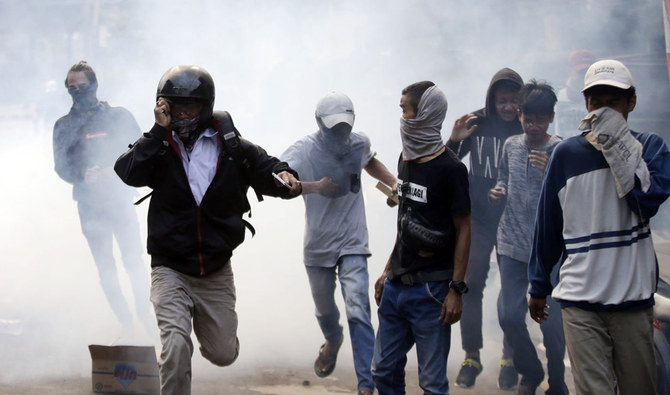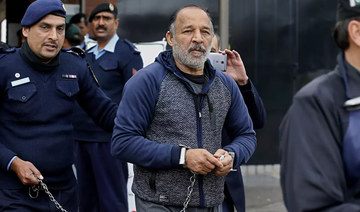JAKARTA: Thousands of young people demonstrating for the past few days in Indonesia’s capital and other major cities have evoked a sense of deja vu in those who remember the 1998 student protests in the country that brought an end to authoritarian rule. But this time it is about something else.
“The students’ movement back then was for political rights, while now it is for civil liberties,” said Saidiman Ahmad, who two decades ago participated in the mass protests that forced President Suharto to resign after 32 years in power.
“I see the demonstrations as an overflow of anger caused by repression by the state and religious orthodoxy against civil liberties. It is not a new thing. This resistance has already been visible in social media and online. Now it has taken to the streets,” the researcher at Saiful Mujani Research and Consulting (SMRC) told Arab News.
The trigger of the demonstrations have been revisions to the law that governs the country’s antigraft body and planned revisions to the Criminal Code.
As the current House of Representatives (DPR) is ending its term this month, lawmakers have rushed to pass controversial legislation, which according to the Jakarta Legal Aid Institute (LBH Jakarta) head of advocacy, Nelson Nikodemus Simamora, “contradicts the public will, public reason.”
He said the revisions have greatly weakened the authority of the Corruption Eradication Commission (KPK), “contradicting the public will for having Indonesia free from corruption.”
“People are already fed up with the corruption of state officials, as it affects their lives. The (recent) appointment of the KPK’s new leaders, which was also flawed ethically and with regard to their track records, has also added to public anger,” he said.
Lighter sentencing for graft convicts is one of the main problems that would come with revisions to the Criminal Code.
But there are many more clauses that would result in an illiberal change in the country’s democratic environment.
“Now there would be these clauses that will allow to imprison or penalize those who are critical of the government, state institutions, president or vice president,” Simamora said.
Numerous problematic stipulations have been hastily inserted by lawmakers into the new code without public consultation. While media reports have reduced some of the issues raised during the protests as opposition to the criminalization of extramarital sex, the protesters themselves see the main danger posed by the revisions as an unprecedented interference by the state into the private space of people’s lives.
In the current Criminal Code, many clauses already work to public disadvantage, argues one of the protesters, Cania Citta Irlanie, who is also the head of content at political education media at Geolive.id, yet while they have not been removed, new ones are causing further disquiet.
“What’s the urgency of having adultery expanded to single, unmarried people engaging in consensual sex?” Irlanie said, referring to a controversial clause that expands the scope of adultery.
Under current laws it is an offense that has to be reported either by the wife or husband, but with the new Criminal Code also parents will be encouraged to file reports against their adult children if they engage in premarital or extramarital sexual relations.
Besides serving to “accommodate intervention by others into the choices of individuals,” as Irlanie put it, the new Criminal Code according to her would also threaten critical thinking, “criminalize science and logic” through the strengthening of blasphemy laws.
“Even talking about evolution could bring blasphemy charges,” she said, citing the new provision of four years’ imprisonment for those who “incite others to negate anyone’s religious beliefs.”
Although representatives of the House vowed on Tuesday to postpone the enactment of the revised Criminal Code and a number of other bills, protests are expected to continue until sitting lawmakers have officially finished their term, or even longer, as pressure is mounting on the government to act against the recently passed legislation that has already weakened the country’s capacity to counter corruption.




























